英语语法---限定词(最新整理)
- 格式:pdf
- 大小:115.30 KB
- 文档页数:4
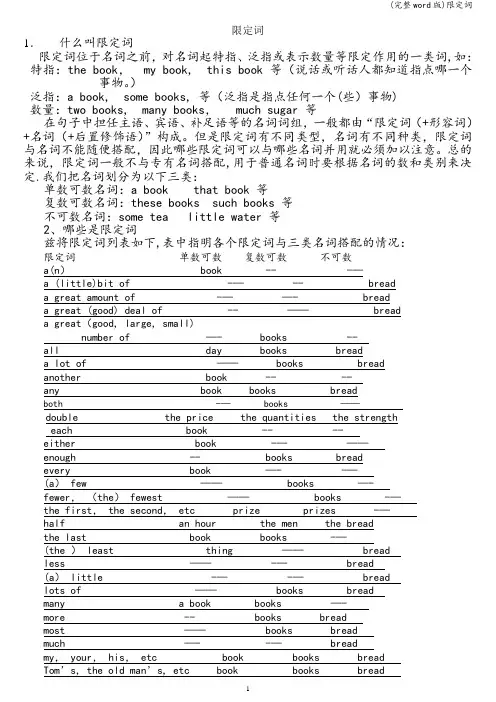
限定词1.什么叫限定词限定词位于名词之前,对名词起特指、泛指或表示数量等限定作用的一类词,如:特指:the book, my book, this book 等(说话或听话人都知道指点哪一个事物。
)泛指:a book, some books, 等(泛指是指点任何一个(些)事物)数量:two books, many books, much sugar 等在句子中担任主语、宾语、补足语等的名词词组,一般都由“限定词(+形容词)+名词(+后置修饰语)”构成。
但是限定词有不同类型,名词有不同种类,限定词与名词不能随便搭配,因此哪些限定词可以与哪些名词并用就必须加以注意。
总的来说,限定词一般不与专有名词搭配,用于普通名词时要根据名词的数和类别来决定.我们把名词划分为以下三类:单数可数名词:a book that book 等复数可数名词:these books such books 等不可数名词:some tea little water 等2、哪些是限定词兹将限定词列表如下,表中指明各个限定词与三类名词搭配的情况:限定词单数可数复数可数不可数a(n) book -- -—a (little)bit of -— -- breada great amount of -——- breada great (good) deal of -- —— breada great(good, large, small)number of —- books --all day books breada lot of —— books breadanother book -- --any book books breadboth -— books ——double the price the quantities the strengtheach book -- --either book -———enough -- books breadevery book —- -—(a) few —— books —-fewer,(the) fewest —— books -—the first, the second, etc prize prizes -—half an hour the men the breadthe last book books -—(the ) least thing —— breadless —— -— bread(a) little -— -— breadlots of —— books breadmany a book books —-more -- books breadmost —— books breadmuch —- -— breadmy, your, his, etc book books breadTom’s, the old man’s, etc book books breadneither book -- --the next book books --no book books breadone book ———-one-third, two—fifths, etc (of)the book (of) the books the timeother student students breadthe other book books --plenty of —- books breadseveral -- books --some (某一)book books breadsuch book books breadthat book books breadthe book books breadthese -— books —-this book -— breadthose -- books ——twice, three times, etc the figure the quantities his strengthtwo, three, etc —- books --what(ever) book books breadwhich(ever) book books breadwhose book books breadzero(不用冠词或其它限定词) man men bread[注] 表内“-”表示有关限定词不能与该类名词搭配.限定词的搭配 1、概说名词词组中,当两个或两个以上的限定词同时出现时,限定词之间有一定的搭配关系,根据其不同的搭配位置可分为三类,其中最重要的一类是中位限定词,:Write your answer on every other line。
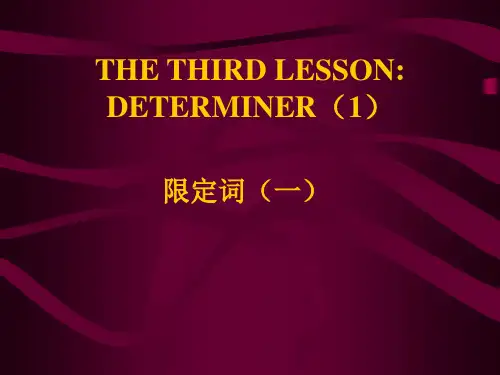
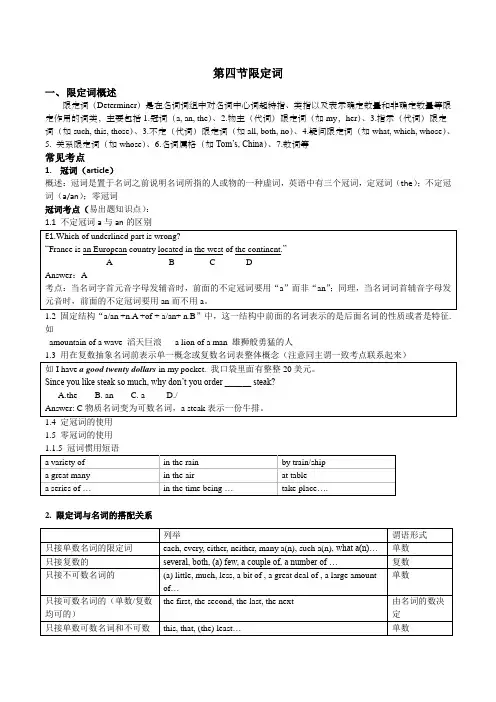
第四节限定词一、限定词概述限定词(Determiner)是在名词词组中对名词中心词起特指、类指以及表示确定数量和非确定数量等限定作用的词类,主要包括1.冠词(a, an, the)、2.物主(代词)限定词(如my,her)、3.指示(代词)限定词(如such, this, those)、3.不定(代词)限定词(如all, both, no)、4.疑问限定词(如what, which, whose)、5. 关系限定词(如whose)、6.名词属格(如Tom’s, China)、7.数词等常见考点1.冠词(article)概述:冠词是置于名词之前说明名词所指的人或物的一种虚词,英语中有三个冠词,定冠词(the);不定冠词(a/an);零冠词冠词考点(易出题知识点):1.1 不定冠词a与an的区别1.2 固定结构“a/an +n.A +of + a/an+ n.B”中,这一结构中前面的名词表示的是后面名词的性质或者是特征. 如amountain of a wave 滔天巨浪 a lion of a man 雄狮般勇猛的人1.3 用在复数抽象名词前表示单一概念或复数名词表整体概念(注意同主谓一致考点联系起来)如I have a good twenty dollars in my pocket. 我口袋里面有整整20美元。
Since you like steak so much, why don’t you order ______ steak?A.theB. anC. aD./Answer: C物质名词变为可数名词,a steak表示一份牛排。
1.4 定冠词的使用1.5 零冠词的使用2. 限定词与名词的搭配关系3.限定词与限定的之间的搭配关系3.2 多个限定词相遇时,其位置使用规则*基本规则:“前位+中位+后位”both the brothers all his two daughters (前+中+后)all other students (前+后) those last few minutes (中+后+后)*such做限定词有特殊规则:such+不定冠词(such位于前)当such 和其他的限定词(some, any, no, fall, few, another, other, many, one, two等)搭配时,such是后位限定词,如I’ve never seen such a dog.All such problems should be considered.4. 特殊限定词的使用4.1some 和any 的用法1)some, any与复数名词和不可数名词搭配,表“一些”some 和单数名词搭配表“某一”any与单数名词搭配表“任一”2)some一般用于肯定句中,也可以用在表示希望对方给出肯定回答的疑问句中any 多用语疑问,否定句,条件句,if/whether引导的从句3)固定搭配some day 来日some day or other 迟早not…any longer/more 不再at any rate/in any case 无论如何4.2no 的用法1)no可以修饰单数可数名词,复数名词和不可数名词,其意义相当于“not a “ “not any”, 所以no不能和a(n), any 连用。
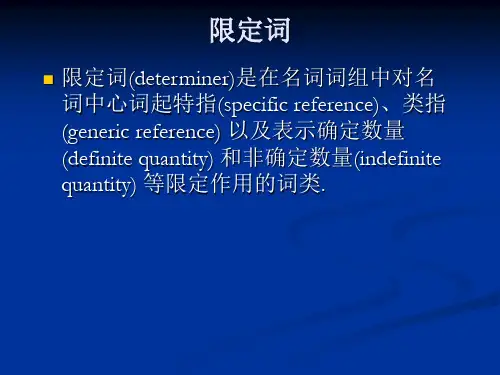

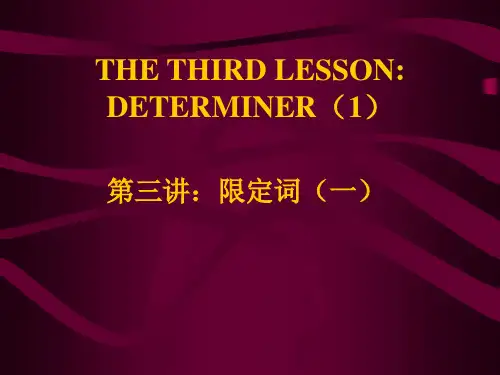
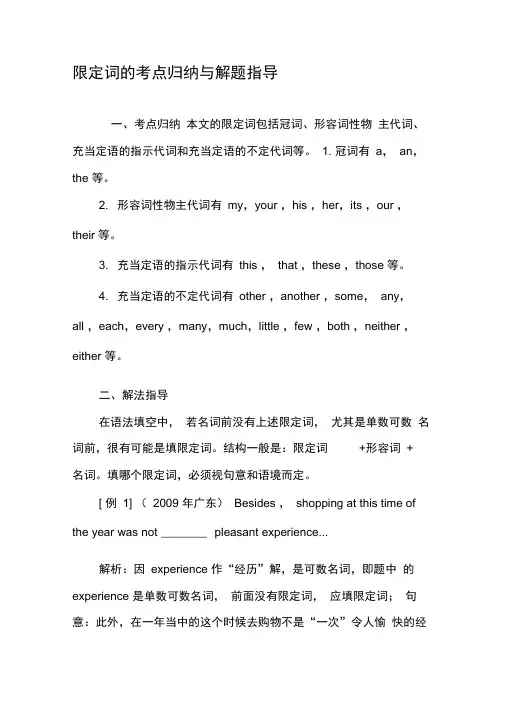
限定词的考点归纳与解题指导一、考点归纳本文的限定词包括冠词、形容词性物主代词、充当定语的指示代词和充当定语的不定代词等。
1. 冠词有a,an,the 等。
2. 形容词性物主代词有my,your ,his ,her,its ,our ,their 等。
3. 充当定语的指示代词有this ,that ,these ,those 等。
4. 充当定语的不定代词有other ,another ,some,any,all ,each,every ,many,much,little ,few ,both ,neither ,either 等。
二、解法指导在语法填空中,若名词前没有上述限定词,尤其是单数可数名词前,很有可能是填限定词。
结构一般是:限定词+形容词+名词。
填哪个限定词,必须视句意和语境而定。
[ 例1] (2009 年广东)Besides ,shopping at this time of the year was not _______ pleasant experience...解析:因experience 作“经历”解,是可数名词,即题中的experience 是单数可数名词,前面没有限定词,应填限定词;句意:此外,在一年当中的这个时候去购物不是“一次”令人愉快的经历。
故填a。
[例2] (2010 年广东)A you ng manwhile traveli ng througha desert ,came across a spring of clear water. _______water was sweet.解析:前面出现过water ,后面再次提到,故应该填定冠词The。
[ 例3] (2011 年广东)We had ______ amazing conversation.解析:单数可数名词conversation 前无限定词,应填限定词;表示“一次”用不定冠词;又因为后面的单词是以元音音素开头,故用an。
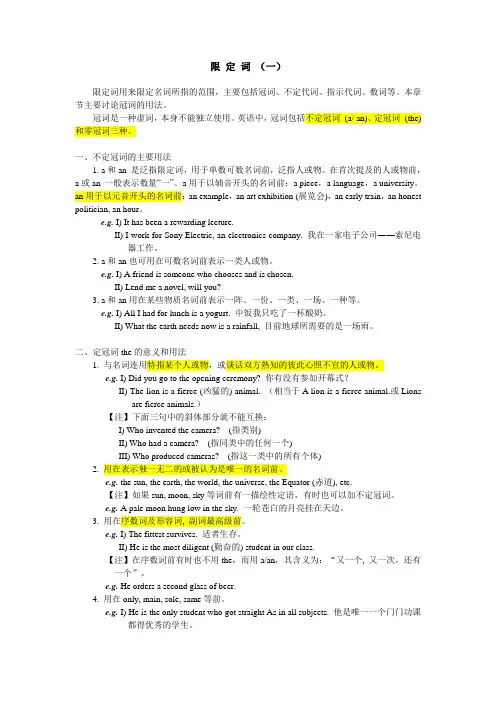
限定词(一)限定词用来限定名词所指的范围,主要包括冠词、不定代词、指示代词、数词等。
本章节主要讨论冠词的用法。
冠词是一种虚词,本身不能独立使用。
英语中,冠词包括不定冠词(a/ an)、定冠词(the) 和零冠词三种。
一、不定冠词的主要用法1. a和an 是泛指限定词,用于单数可数名词前,泛指人或物。
在首次提及的人或物前,a或an 一般表示数量“一”。
a用于以辅音开头的名词前:a piece,a language,a university。
an用于以元音开头的名词前:an example,an art exhibition (展览会),an early train,an honest politician, an hour。
e.g. I) It has been a rewarding lecture.II) I work for Sony Electric, an electronics company. 我在一家电子公司――索尼电器工作。
2. a和an也可用在可数名词前表示一类人或物。
e.g. I) A friend is someone who chooses and is chosen.II) Lend me a novel, will you?3. a和an用在某些物质名词前表示一阵、一份、一类、一场、一种等。
e.g. I) All I had for lunch is a yogurt. 中饭我只吃了一杯酸奶。
II) What the earth needs now is a rainfall, 目前地球所需要的是一场雨。
二、定冠词the的意义和用法1. 与名词连用特指某个人或物,或谈话双方熟知的彼此心照不宣的人或物。
e.g. I) Did you go to the opening ceremony? 你有没有参加开幕式?II) The lion is a fierce (凶猛的) animal. (相当于A lion is a fierce animal.或Lions are fierce animals.)【注】下面三句中的斜体部分就不能互换:I) Who invented the camera? (指类别)II) Who had a camera? (指同类中的任何一个)III) Who produced cameras? (指这一类中的所有个体)2. 用在表示独一无二的或被认为是唯一的名词前。
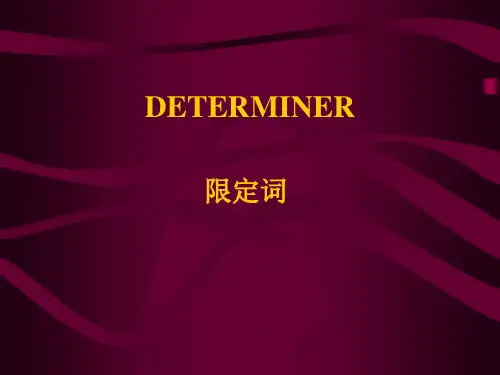
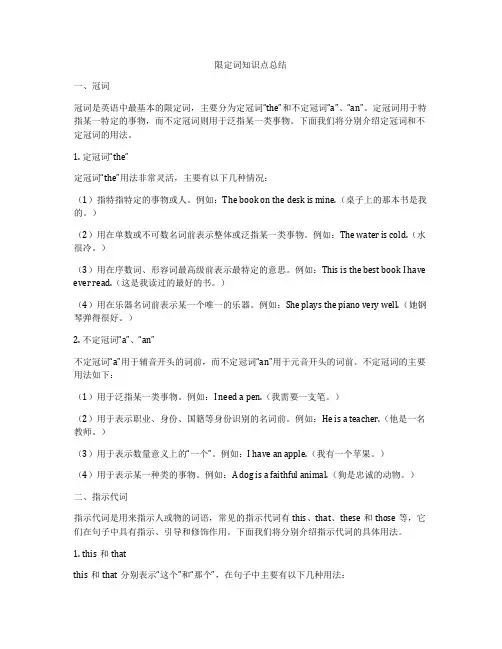
限定词知识点总结一、冠词冠词是英语中最基本的限定词,主要分为定冠词“the”和不定冠词“a”、“an”。
定冠词用于特指某一特定的事物,而不定冠词则用于泛指某一类事物。
下面我们将分别介绍定冠词和不定冠词的用法。
1. 定冠词“the”定冠词“the”用法非常灵活,主要有以下几种情况:(1)指特指特定的事物或人。
例如:The book on the desk is mine.(桌子上的那本书是我的。
)(2)用在单数或不可数名词前表示整体或泛指某一类事物。
例如:The water is cold.(水很冷。
)(3)用在序数词、形容词最高级前表示最特定的意思。
例如:This is the best book I have ever read.(这是我读过的最好的书。
)(4)用在乐器名词前表示某一个唯一的乐器。
例如:She plays the piano very well.(她钢琴弹得很好。
)2. 不定冠词“a”、“an”不定冠词“a”用于辅音开头的词前,而不定冠词“an”用于元音开头的词前。
不定冠词的主要用法如下:(1)用于泛指某一类事物。
例如:I need a pen.(我需要一支笔。
)(2)用于表示职业、身份、国籍等身份识别的名词前。
例如:He is a teacher.(他是一名教师。
)(3)用于表示数量意义上的“一个”。
例如:I have an apple.(我有一个苹果。
)(4)用于表示某一种类的事物。
例如:A dog is a faithful animal.(狗是忠诚的动物。
)二、指示代词指示代词是用来指示人或物的词语,常见的指示代词有this、that、these和those等,它们在句子中具有指示、引导和修饰作用。
下面我们将分别介绍指示代词的具体用法。
1. this和thatthis和that分别表示“这个”和“那个”,在句子中主要有以下几种用法:(1)用于指示近处或者说话者手中的事物。
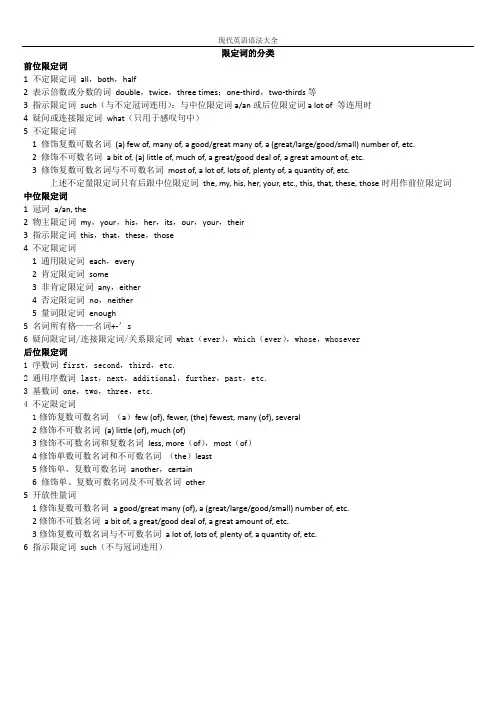
限定词的分类前位限定词1 不定限定词all,both,half2 表示倍数或分数的词double,twice,three times;one-third,two-thirds等3 指示限定词such(与不定冠词连用):与中位限定词a/an或后位限定词a lot of 等连用时4 疑问或连接限定词what(只用于感叹句中)5 不定限定词1 修饰复数可数名词(a) few of, many of, a good/great many of, a (great/large/good/small) number of, etc.2 修饰不可数名词a bit of, (a) little of, much of, a great/good deal of, a great amount of, etc.3 修饰复数可数名词与不可数名词most of, a lot of, lots of, plenty of, a quantity of, etc.上述不定量限定词只有后跟中位限定词the, my, his, her, your, etc., this, that, these, those时用作前位限定词中位限定词1 冠词a/an, the2 物主限定词my,your,his,her,its,our,your,their3 指示限定词this,that,these,those4 不定限定词1 通用限定词each,every2 肯定限定词some3 非肯定限定词any,either4 否定限定词no,neither5 量词限定词enough5 名词所有格——名词+-'s6 疑问限定词/连接限定词/关系限定词 what(ever),which(ever),whose,whosever后位限定词1 序数词 first,second,third,etc.2 通用序数词 last,next,additional,further,past,etc.3 基数词 one,two,three,etc.4 不定限定词1修饰复数可数名词(a)few (of), fewer, (the) fewest, many (of), several2修饰不可数名词(a) little (of), much (of)3修饰不可数名词和复数名词less, more(of),most(of)4修饰单数可数名词和不可数名词(the)least5修饰单、复数可数名词another,certain6 修饰单、复数可数名词及不可数名词other5 开放性量词1修饰复数可数名词a good/great many (of), a (great/large/good/small) number of, etc.2修饰不可数名词a bit of, a great/good deal of, a great amount of, etc.3修饰复数可数名词与不可数名词a lot of, lots of, plenty of, a quantity of, etc.6 指示限定词such(不与冠词连用)限定词与名词的搭配关系A 只修饰单数可数名词的限定词前位限定词what a;中位限定词a/an, each, every, either, neither;后位限定词many a, one, etc.B 只修饰复数可数名词的限定词前位限定词both后位限定词two,three,etc.,(a) few, fewer, (the) fewest, many, several, these, those.前位限定词或后位限定词a good/great many (of), a (great/good/small) number of, etc.C 只能与不可数名词连用的后位(或前位)限定词(a)bit of, a good deal of, a great deal of, a great amount of, (great/large) amounts of, (a) little (of), much (of) D 只与单数和复数可数名词连用的后位限定词first, second, third, etc., last, next, another, (a) certain, etc.E 只与不可数名词和复数可数名词连用的限定词中位限定词enough, 零冠词后位限定词less, more, most, a lot of, lots of, plenty of, a quantity ofF 只与单数可数名词及不可数名词连用的限定词中位限定词this, that后位限定词(the) leastG可与单、复数可数名词及不可数名词连用的限定词前位限定词all, half, double, twice, three times, one-third, two-thirds, such中位限定词the, my, your, etc., some, any, either, no, what(ever), which(ever), whose, whosever, 名词所有格后位限定词additional, further, past, other, such代词分类表。
限定词数量限定词只与可数名词连用只接单数 one each every只接复数 two(three) both a couple of a few several many a number of只与不可数名词连用a little little much a great deal of a large amount of与可数名词复数或不可数名词连用均可not any some a lot of lots of plenty of most all数量词与of连用all/most/some/any of+特指限定词+复数可数或不可数名词most booksmost of books 不正确most of my/these/the/john’s booksmany/a few/few/several/both/two/three of +特指限定词+ 复数可数名词many studentsmany of students 不正确many of these studentsmuch/a little/little of +特指限定词+ 不可数名词much watermuch of water 不正确much of the water其他数量词 a lot of , lots of , a couple of , plenty of , a number of , a great deal of 直接+名词all和both特殊用法all/both my students 可以不加of,其他much/many数量限定词不可这么用all studentsall of my studentsall of students 不正确数量词a few, few(只接可数), a little, little(只接不可数)a little,a few为肯定之意,等同于some,有一些His theory is rather difficult; few people understand it.=almost no people understand it.I have little interest in English, so I am very poor at it.little,few为否定之意,等同于几乎没有His theory is rather difficult, but a few people understand it.I have a little interest in English, so I like learning it.only a little,only a few very few,very littlesome and any陈述句:some 一般用肯定,any一般用否定,表示”一些“。
定词是与名词密切相关的词类,包括冠词( a ( n ),the )、形容词性指示代词( this ,that, these,those )、形容词性物主代词 ( my,your ,our,etc .)、形容词性不定代词( both,every ,much,some, etc .)、数词( one,two ,etc ;first ,second,etc .;one-third,three-fifths ,etc .) 和特指形容词 ( next,only,etc .)。
限定词用于名词的前面,限定名词所指的范围,表示该名词是特指还是泛指,是定量还是不定量。
限定词的使用并非随意,受着名词种类及形式的制约,与名词有着特定的搭配关系,在多个限定词连用时相互之间还有着相对固定的位置限定词一般不用于专有名词,用于普通名词时要根据名词的数和类别来决定。
普通名词可分为如下三类:单数可数名词,如: a desk, a pencil 等。
复数可数名词,如: desks, pencils 等。
不可数名词,如: coffee, fire 等。
各限定词与三类名词搭配关系可分为以下几种情况:A. 能与三类名词搭配的限定词定冠词 the, 如:the book, the books, the bread 等。
物主代词、名词所有格,如: my /John's book my /John's books my /John's breadall / some / any / no ,如: all / some / any / no book all / some / any / no booksall / some / any / no breadother / such ,如: other / such student other / such studentswh -words (eg. what, which, whose 等)。
限定词(determiner)限定词的先后顺序:前位---中位---后位(一个名词中心词之前不可并用两个前位限定词或两个中位限定词)冠词的表意功能冠词在各类名词之前的用法(参见P76)(1)The ten of them have passed the final examination.Ten of them have passed the final examination.Ten of the (these/his) students have passed the final examination.(2)They asked to stop counting presidential votes for a second time.(3)Every boy and every girl___(have) his merits.Every young man, young lady,and child ___(be) requested to take part.Many a person___(be) going to the take the test.(4)Other or anotherCalifornia covers a large area than __________state except Alaska and Texas.Out of the three foreign guests, one is from Frankfurt, ______two are from Vienna.Don't lose heart. Have ___try.There's room for _________people in the back of the bus.National Day is coming. We'll have _____ five-day holiday.(5)冠词的用法Who is ___captain of your team?Mr. Reagan was elected ___President of the United States in 1980.Charles Dickens,__author of David Copperfield, was a distinguished English novelist.As ____physician, he does not deserve much praise.He was covered with snow from ___head to __foot.The relation between ___teacher and ___student is excellent.This room serves the triple purpose of ___study, ___bedroom and ____sitting room. The old man was sitting in a chair, ___pipe in ___hand.He sat at ___ table, ___coat off, ___head down, and __pen in ___hand.What kind of ___man is he?What sort of ___book do you want?The work is ____pleasure to me.She has developed ___love for labour.Physics is ____ science.He spoke with _____ enthusiasm which inspired us all.Do you like ___ music of ___film?Phonetics is ____science of speech sounds。
.Unit 5 限定词总结限定词与可数、不可数名词搭配以上限定词与of联用时,of后面必须有一个“特指限定词”,然后才能接名词。
限定词与of短语数量或个体限定词用作代词,此时+of数量或个体词+of+特指限定词+复数名词或者不可数名词注意:本身就带有of的数量词组如a lot of,lots of, a couple of,plenty of,a number of,a great deal of 等,必须直接与名词连用,不加特指限定词。
. al和both的特殊用法All students are clever.All of my students are clever. All my students are clever.Both students are clever. Both of my students are clever. Both my students are clever.不定代词与of短语不定代词;none,someone,anyone,everyone.None of us has a gift.我们当中没人有礼物。
Every one of us has a gift.我们当中每个人都有礼物。
Some one of us has a gift.我们当中有些人有礼物。
Any one of us has a gift.我们当中任何人都有礼物。
练习1 I read a few books yesterday.2 Some my students are a little lazy.3 Some my students are a little lazy and some students are hard-working.4 I am new here.I don’t know many people.限定词之间的位置关系限定词分三类:前位限定词,中位限定词,后位限定词。
限定词练习1) My shoes have been worn out. I'll have to buy______.A) some new pair B) a new oneC) some new ones D) a new pair2) If ______letter arrives for me, can you send it to this address?A) no B) someC) any D) some more3)Taxes and death may come to______, but they never come with impartiality.A) all men B) all of manC) all men D) all of men4)Miss Green contributed fifty dollars, but she wished she could contribute______.A) one other fifty dollars B) the same amount alsoC) more fifty dollars D) another fifty5)Our monitor is always ready to do good to______.A) the other B) the othersC) other D)others6)______of them knew about the plan because it was secret.A) Some B) AnyC) No one D) None7)There is very ______hope that he will survive the car accident.A) few B) a fewC) much D) little8)I have two brothers. One is a scientist; ______is an artist.A) another B) the otherC) others D) the others9)On Sundays, they often go to ______to hear music.A) a churchB) the churchC) church D) some churches10) Do you have ______coffee left?A) some B) any C) any of D) a lot11) Hand in a composition every ______week, please.A) some B) otherC) others D) another12)Even if they are on sale, these shoes are equal in price to ______,if not more expensive, at the other store.A) anyone B) the othersC) that D) the ones13) If we continue to argue over minor points, we won't get ______near a solution.A) somewhere B) nowhereC) anywhere D) elsewhere14)Some will water the apple trees, ______will weed the cotton fields.A) another B) the otherC) the others D) other15)We must make use of contradictions, win over the many, oppose______.A) the little B) the fewC)a little D) a few16)Ramon burned the roast. He didn't want to tell Betty about______, so he bought______.A) them; more one B) it; the otherC) one; the others D) it; another one17) Two people had met the general before, but ______recognized him.A) either B) neitherC) any D) some18) I have read ______you lent me.A) all of books B) the all booksC) all the books D) whole the books19) We are so glad that we have reaped ______harvest this year.A) the other B) anotherC) other D) the another20)I have had enough cake. Would you like______?A) one more B) some moreC) any more D) another one21)______child will find his own personal road to success.A) Every B) EachC) Some D)The22)I have classes ______day—Mondays, Wednesdays and Fridays.A) each B) every otherC) this and the other D) all other23) There was ______food left, though we all got hungry.A) little B) a littleC) a few D) few24)I haven't finished reading that French book, ______has my friend.A) so B) neitherC) also D) as well25)Some people prefer classical music, while ______prefer rock music.A) other B) the otherC) another D) others限定词部分练习题1)D 2)C 3)C 4)D 5)D 6)D 7)D 8)B9)C 10)B 11)B 12)D 13)C 14)C 15)B 16)D17)B 18)C 19)B 20)B 21)B 22)B 23)A 24)B25)D。
限定词( determiner)限定词是在名词词组中对名词中心词起特指、泛指、定量或不定量等限定作用的一类词。
一、英语限定词种类1. 定冠词,不定冠词,零冠词。
如: the, a2. 名词属格。
女口: my friend ' s, Tom s …3. 物主限定词。
如:my, your…4. 指示限定词。
如: this, that, these, those, such …5. 疑问限定词。
如: what, whose, which …6. 关系限定词。
如: which, whose …7. 不定限定词。
如: some, any, each, every, either, neither, all8. 数词 (基数词、序数词、倍数词、分数词 )9. 量词。
如: a lot of, lots of , a great/good deal of ,a great/large/good number of二、限定词与三类名词的搭配关系限定词按它词汇意义可分为特指限定词、泛指限定词、定量限定词、不定量限定词四大类。
这四类限定词有的能与单数、复数可数名词搭配,也可与不可数名词搭配1) 能与三类名词搭配的限定词主要有the; my, John ' s, the old man ' s…;some, any, no, all, other, such, what ( ever ), which (ever), whoseeg. the book - the books ------ the money,my book ---- my books -- my moneyJohn ' s book--- John ' s books -- John 's money2) 能与单数名词搭配的限定词。
如 :a (n) , each, every, another, either ,one, neither, many a, such a(n) …eg. each worker , every student ,either book ,another book3) 能与复数名词搭配的限定词。